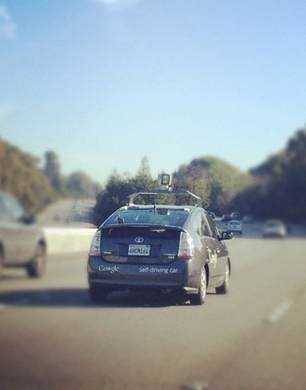
Photo Credit: Maria Ly
There’s been a lot of talk surrounding driverless cars over the past year. In early 2015, driverless cars were introduced onto the streets on a trial period in some of the UK’s top cities. As they look likely to hit the mainstream market in the not too distant future, it’s got drivers wondering how it will affect the motoring world. One thing you may be concerned about it travel sickness. Will autonomous cars help or hinder when it comes to motion sickness?
Travel sickness set to be a major problem
While the major concern regarding driverless vehicles has so far been a fear of lack of control, there’s another pressing problem that’s gaining momentum. As featured by the Telegraph, travel sickness is likely to cause huge problems within the industry. A recent study carried out by the University of Michigan has shown that travel sickness is expected to rise by around 27.8pc. This includes symptoms such as nausea, vomiting and dizziness.
As you aren’t in control of the direction you are travelling with driverless cars, it increases the chances of motion sickness symptoms developing. In order to prevent these symptoms, you would need to keep an eye on the road at all times. So activities such as reading, watching TV programs on a tablet or laptop and texting won’t be as pleasant as you think. The only activity that wouldn’t lead to travel sickness is sleeping and it’s unclear how much you might be relied upon as a ‘plan B’ in light of a fault, so you may not be able to simply drift off and leave the car to it, especially if you’re on your own.
Future developments needed to reduce the risks
If driverless car manufacturers want to reduce the risk of travel sickness, future developments need to work on eliminating the problem. Bigger windows and forward facing seats are just two things that can make a positive difference. It is also likely laptop manufacturers will need to make changes too. Developing a screen that moves adequately with the different motions of the car will also help to reduce the problem.
Test still important
While some are excited about driverless cars entering the mainstream market, there are a lot of drivers who would currently refuse to get in them. There are stigmas that need to be reduced before they can become hugely successful. One worry is what will become of driving tests, both theory and practical. As you won’t be in control of the vehicle, will there be a need to pass a driving test and would tests become redundant? Actually, though, if you need to be alert and step in wherever and whenever a problem occurs then it’s more likely that the sort of practical and theory considerations drivers learn in the test will be vital. With new signs and markings possible, it’s possible that we’ll all need to log on and update our knowledge of the rules of the road.
It’s a scary thought giving control over to a computer. Security issues would need to be addressed too. The last thing you want to worry about is whether somebody could hack into the system and take control of your car. However, it isn’t all negative. In recent news, the BBC has highlighted how driverless vehicles could actually boost rural transportation.
Overall there are a lot of concerns that need to be addressed before the public comes around to the idea of driverless cars. Travel sickness is one of the latest worries that does pose a serious risk to passengers and, as things stand, looks like something that will be made worse by autonomous technology. Future developments may help to reduce the problem, but it is one of a number of hurdles that needs to be overcome.

